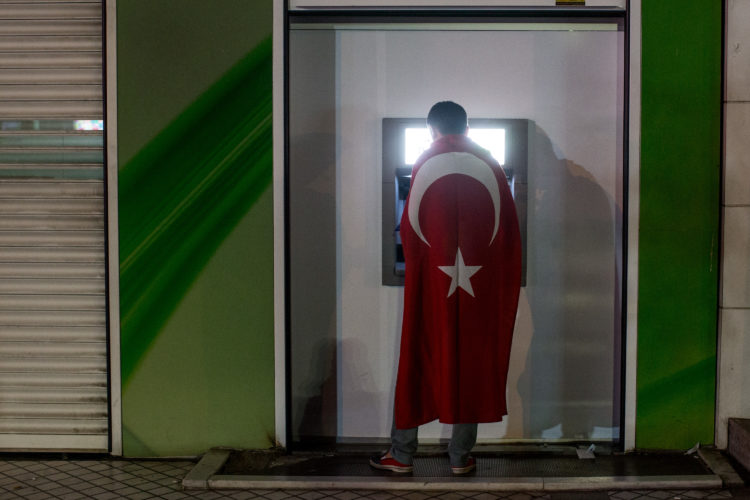From the earliest moments of the failed attempt to topple Turkish President Recep Tayyip Erdogan, a war of words, opinions and accusations was sparked among hundreds of thousands of Egyptian social-media users.
Many Egyptians spent most of their weekend following the Turkish developments, each user commenting on the conflict according to his/her personal view on the 2013 toppling of Egypt’s Islamist president, Mohamed Morsi, at the hands of the army in July of 2013.
A democratically-elected Islamist president is being disputed by the secular yet still conservative army in two countries.
There may be little in common between the Turkish and Egyptian economic and political realities and regional stature, yet the resemblance of the attempted coup in Turkey to Egypt could not have been clearer: a democratically-elected Islamist president is being disputed by the secular yet still conservative army in two countries where the military has maintained a strong grip on political power for decades.

The Egyptian online fuzz was crystalised with the formation of three fractions. The first were Islamists in general and Muslim Brotherhood members, supporters and sympathisers in particular. There are those who are still bitter at the loss of power and the vanishing of what seemed to be the political Islamist project in Egypt. They never forgot that their dream of ruling the most-populous Arab nation was destroyed by the hands of the military accompanied by the public endorsement or the silent content of millions of Egyptians.
Erdogan is the closest a Muslim leader has ever come to the ‘wonder days’ of medieval Muslim caliphs.
The Turkish AK Party was born from the Muslim Brotherhood ideology and according to many Islamists, Erdogan is the closest a Muslim leader has ever come to the ‘wonder days’ of medieval Muslim caliphs. Brotherhood supporters have wasted no opportunity in blaming other Egyptians for the return of military rule, which many Egyptians thought to have gone after the toppling of Mubarak in 2011.
Friday’s coup attempt and what followed in Turkey gave Egyptian Islamists the opportunity to get back at their fellow countrymen once more, by showing online ferocity in supporting Erdogan and highlighting the ‘Turkish people’s political awareness when they took to the streets to protect Erdogan’ in face of millions of Egyptians who protested to back the army against Morsi’s ouster.
(This guy is accusing Egyptian liberals of supporting the coup just because of their hatred of Islamists and the Brotherhood.)
(This user is comparing the ‘courageous’ people defending an elected president and an Egyptian army that defends a coup.)
(This guy is using this trend #enough_shame to call on Egyptians to stop their shameful worship of the army.)
The second online faction consisted of political conservatives who support the grip of the army and the power of the state. Many of those opposed the Arab Spring altogether and are happy to see an army man at the helm in Egypt. Their resentment of the Islamist project was enhanced by Erdogan’s chronic criticism of Egypt’s army and his public support of Morsi. To them, Erdogan is a public enemy and his rule in Turkey should be crushed before it is adopted by any other neighbouring country.
(Army supporter who was happy to see the coup against Erdogan.)
(Someone else who was happy to see the coup.)
The third sect consisted of Egyptian liberals: those who are happy to see Morsi gone but are lamenting the current army rule in Egypt. They hate Erdogan but know that military coups never bring better resolutions. That team was even divided into two when each user started analysing the Turkish situation. Liberal surrealists generally contradicted Islamists yet agreed with them in the discourse pointing out to the Turkish people’s ‘decisive’ struggle alongside Erdogan against the coup, while more realistic and pragmatic liberals thought this was simplistic, and voiced their belief that the Turkish coup solely failed because the army was not unified against the Turkish President.
Swearing and cursing of each side against the other continue till today. The Egyptian online sphere has been totally dominated by the Turkish failed coup. Influencers and others started unfriending and unfollowing people on Facebook and Twitter as discussions became heated and personal, and thousands others found the time to make fun of the whole thing by posting sarcastic memes urging coup plotters to learn the trade from Egypt’s army!
(A liberal user unhappy with both the coup and Erdogan.)
(Someone who thinks Turkish people defeated the coup by themselves.)
Like many other online trends that reach maximum peak within minutes in Egypt, the Turkish coup discourse will eventually fade away. Nonetheless, it has come to show the deep division – at least among Egyptian online users – on the unclosed chapter of the 2013 toppling of Morsi and the deaths and arrests and violations that have taken place in Egypt since then.
(Someone having a laugh at the whole thing.)
